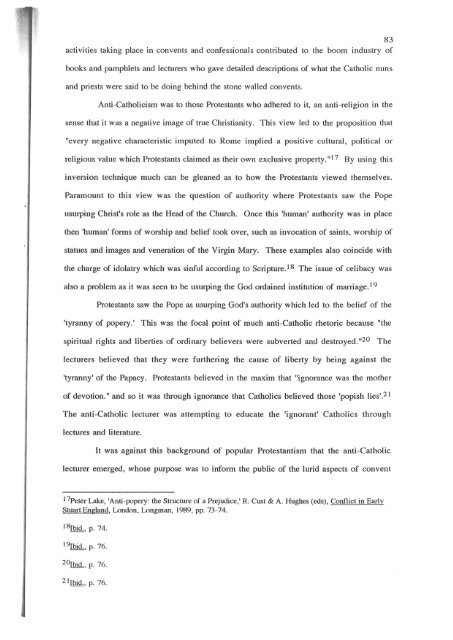TRANSPLANTED IRISH INSTITUTIONS - University of Canterbury
TRANSPLANTED IRISH INSTITUTIONS - University of Canterbury
TRANSPLANTED IRISH INSTITUTIONS - University of Canterbury
You also want an ePaper? Increase the reach of your titles
YUMPU automatically turns print PDFs into web optimized ePapers that Google loves.
83<br />
activities taking place in convents and confessionals contributed to the boom industry <strong>of</strong><br />
books and pamphlets and lecturers who gave detailed descriptions <strong>of</strong> what the Catholic nuns<br />
and priests were said to be doing behind the stone walled convents.<br />
Anti-Catholicism was to those Protestants who adhered to it, an anti-religion in the<br />
sense that it was a negative image <strong>of</strong> true Christianity. This view led to the proposition that<br />
"every negative characteristic imputed to Rome implied a positive cultural, political or<br />
religious value which Protestants claimed as their own exclusive property. "17 By using this<br />
inversion technique much can be gleaned as to how the Protestants viewed themselves.<br />
Paramount to this view was the question <strong>of</strong> authority where Protestants saw the Pope<br />
usurping Christ's role as the Head <strong>of</strong> the Church. Once this 'human' authority was in place<br />
then 'human' forms <strong>of</strong> worship and belief took over, such as invocation <strong>of</strong> saints, worship <strong>of</strong><br />
statues and images and veneration <strong>of</strong> the Virgin Mary. These examples also coincide with<br />
the charge <strong>of</strong> idolatry which was sinful according to Scripture. 18 The issue <strong>of</strong> celibacy was<br />
also a problem as it was seen to be usurping the God ordained institution <strong>of</strong> marriage. 19<br />
Protestants saw the Pope as usurping God's authority which led to the belief <strong>of</strong> the<br />
'tyranny <strong>of</strong> popery.' This was the focal point <strong>of</strong> much anti-Catholic rhetoric because "the<br />
spiritual rights and liberties <strong>of</strong> ordinary believers were subverted and destroyed. "20 The<br />
lecturers believed that they were furthering the cause <strong>of</strong> liberty by being against the<br />
'tyranny' <strong>of</strong> the Papacy. Protestants believed in the maxim that "ignorance was the mother<br />
<strong>of</strong> devotion." and so it was through ignorance that Catholics believed those 'popish lies'.21<br />
The anti-Catholic lecturer was attempting to educate the 'ignorant' Catholics through<br />
lectures and literature.<br />
It was against this background <strong>of</strong> popular Protestantism that the anti-Catholic<br />
lecturer emerged, whose purpose was to inform the public <strong>of</strong> the lurid aspects <strong>of</strong> convent<br />
17Peter Lake, 'Anti-popery: the Structure <strong>of</strong> a Prejudice,' R. Cust & A. Hughes (eds), Conflict in Early<br />
Stuart England, London, Longman, \989, pp. 73-74.<br />
18Ibid., p. 74.<br />
19rbid., p. 76.<br />
2Orbid., p. 76.<br />
2 I Ibid., p. 76.
















